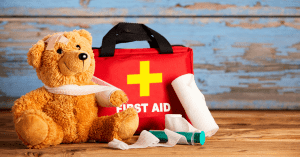Whether you have some extra time on your hands, want to enhance your offering as an employee, or you are simply craving fresh knowledge and skills, short courses have a lot to offer. In early childhood education, short courses can enhance the way you work and open you up to advancements in your career.
Short courses give you the opportunity to upskill without the commitment of a Certificate or Diploma, so you can get extra expertise under your belt in no time.
If you are an employer in the early childhood education sector, it is well worth considering presenting your employees with short course opportunities, with benefits extending from the learner themselves right through to the standard of care delivered in an early learning service.

Short courses benefit everyone in early childhood
Short courses have many benefits, whether you’re an employee in the sector, an employer of educators and of course for those you provide care for.
Here’s what you can expect when you complete a short course as a person qualified to work in early childhood education:
Keep skills up to date
First and foremost, staying on top of crucial skills around infection control and first aid is a must in early childhood education. Keeping those skills up to date can impact staff requirements in rooms and go a long way to delivering the highest standard of care in early childhood education.
Workplace safety
Keeping everyone safe in the workplace is essential and comes down to individual and employer responsibility. With short course qualifications in first aid and infection control, educators are more likely to know how to do things the right way and less likely to have accidents in the workplace. A well-trained team minimises the chance of any mishaps in the future and keeps staff and the children in their care safe.
Motivation in the sector
Short courses can offer a renewed zest for your sector, inspiring early childhood educators to feel motivated to bring their latest knowledge to their work. Employees who feel valued, as when employers support them in upskilling, are more likely to do their best work and feel higher levels of job satisfaction. This means improved staff retention and increased productivity in the workplace.
Stand out in the job market
When you’re looking for a job in early childhood education, it helps when you can stand out for the right reasons. There is no doubt that having qualifications via a short course in first aid or infection control will give you an advantage in the job application process. Plus, offering short course opportunities to potential employees is a great way to attract passionate educators to your service.
Early childhood short courses to consider
So what short courses are most worthwhile and valuable within the early childhood education sector? There are two areas that should be explored as a priority: Infection control and first aid.
Infection control short courses
First, let’s learn more about the infection control skill sets. For those in early childhood education sector, infection control has always been a priority. However, the Covid-19 pandemic impact has brought about a renewed focus on infection control in every sector, including early childhood education. Not only that, but there are many illnesses that can be particularly common in childcare settings such as:
- Whooping cough
- Hand foot and mouth disease
- Influenza
- Gastro
- Common cold
An infection control short course can equip learners with the skills needed to follow policies and procedures within early childhood education organisations that will prevent these illnesses and minimise their spread. As well as being important for safety and wellbeing of everyone at the early learning centre or kindergarten, upholding high standards around infection control is a requirement under the National Quality Framework and can impact a childcare service’s NQS Rating.
Selmar infection control short courses will ensure that early childhood educators have the necessary know-how to implement appropriate precautions and respond to infection risks in the workplace according to sector best practice:
Infection Control Skill Set
This skill set provides the skills to follow organisational infection prevention and control policies and procedures, including implementing standard and transmission-based precautions and responding to infection risks in the workplace.
Cross-sector Infection Control Skill Set
This skill set addresses the skills and knowledge required to undertake work activities in compliance with organisational procedures that prevent and control infection.
Infection Control Skill Set (Food Handling)
This skill set is tailored for organisations where food handling is part of their operations, providing the skills to follow organisational infection prevention and control policies and procedures, including implementing standard and transmission-based precautions and responding to infection risks in the workplace.
More information on our infection control short courses, read more here.
First aid courses for early childhood education
Children’s safety is paramount in early childhood education. Managing allergies, treating injuries and responding appropriately to any situation that requires medical attention are vital skills for those working in the sector. First aid qualifications in early childhood education can minimise risk and injury, and even save lives.
First aid short courses are not just recommended but a requirement for early childhood services. At any time, a number of first aid qualified people must be rostered on in a childcare service.
First aid qualifications cover three distinct areas: general first aid, anaphylaxis management and emergency asthma management. The first aid short courses delivered at Selmar are nationally recognised and hands-on, ensuring learners have the practical skills to apply first aid knowledge when the time comes to use it.
Provide CPR
This course will provide you with the skills and knowledge to perform cardiopulmonary resuscitation (CPR) in line with the Australian Resuscitation Council (ARC) Guidelines.
Provide first aid
This course will give you the skills and knowledge required to provide first aid response, life support, management of casualties, the incident and other first aiders, in a range of situations, including in the home, workplace or within the community, until the arrival of medical or other assistance.
Provide first aid in education and care
This course will provide you with the skills and knowledge to apply first aid in an education and care setting, in the wider community and in your home.
For more information about our first aid short courses click here.
A short course for long-term results
While short courses don’t take very long to complete — as little as a few hours depending on your chosen course — the outcomes are long-lasting.
For maximum results for your career, knowledge and skills in a short period of time, a short course could be just what you need to enhance your career in early childhood education.
Contact Selmar today to find the right short course for you.



